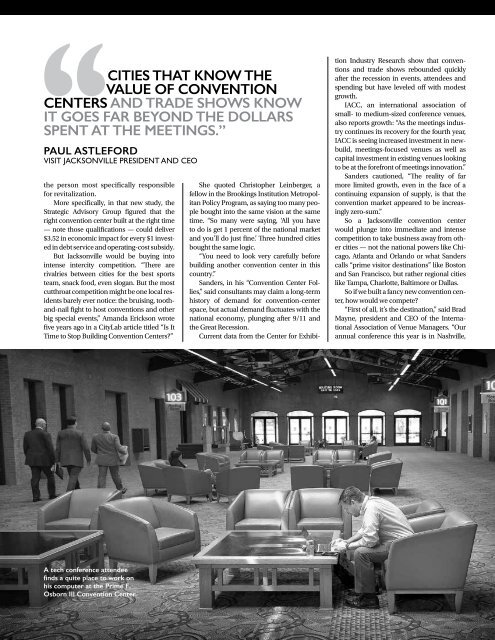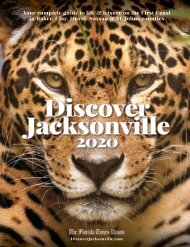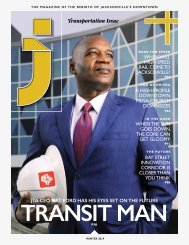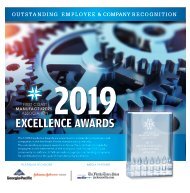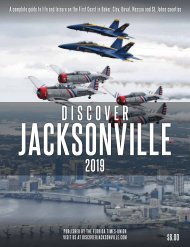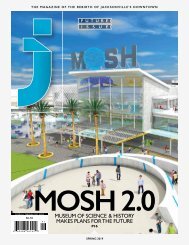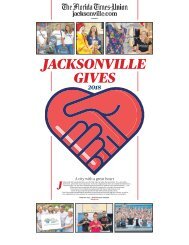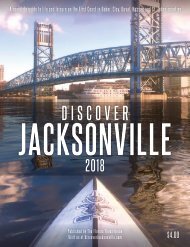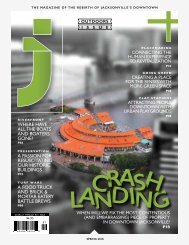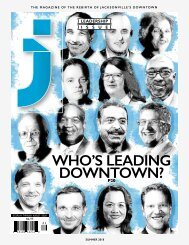J Magazine Fall 2017
The magazine of the rebirth of Jacksonville's downtown
The magazine of the rebirth of Jacksonville's downtown
- TAGS
- jacksonville
Create successful ePaper yourself
Turn your PDF publications into a flip-book with our unique Google optimized e-Paper software.
‘‘<br />
right convention center built at the right time<br />
Cities that know the<br />
VALUE Of convention<br />
centers and trade shows know<br />
it goes far beyond the dollars<br />
spent at the meetings.”<br />
PAUL ASTLEFORD<br />
Visit Jacksonville president and CEO<br />
the person most specifically responsible<br />
for revitalization.<br />
More specifically, in that new study, the<br />
Strategic Advisory Group figured that the<br />
— note those qualifications — could deliver<br />
$3.52 in economic impact for every $1 invested<br />
in debt service and operating-cost subsidy.<br />
But Jacksonville would be buying into<br />
intense intercity competition. “There are<br />
rivalries between cities for the best sports<br />
team, snack food, even slogan. But the most<br />
cutthroat competition might be one local residents<br />
barely ever notice: the bruising, toothand-nail<br />
fight to host conventions and other<br />
big special events,” Amanda Erickson wrote<br />
five years ago in a CityLab article titled “Is It<br />
Time to Stop Building Convention Centers?”<br />
She quoted Christopher Leinberger, a<br />
fellow in the Brookings Institution Metropolitan<br />
Policy Program, as saying too many people<br />
bought into the same vision at the same<br />
time. “So many were saying, ‘All you have<br />
to do is get 1 percent of the national market<br />
and you’ll do just fine.’ Three hundred cities<br />
bought the same logic.<br />
“You need to look very carefully before<br />
building another convention center in this<br />
country.”<br />
Sanders, in his “Convention Center Follies,”<br />
said consultants may claim a long-term<br />
history of demand for convention-center<br />
space, but actual demand fluctuates with the<br />
national economy, plunging after 9/11 and<br />
the Great Recession.<br />
Current data from the Center for Exhibition<br />
Industry Research show that conventions<br />
and trade shows rebounded quickly<br />
after the recession in events, attendees and<br />
spending but have leveled off with modest<br />
growth.<br />
IACC, an international association of<br />
small- to medium-sized conference venues,<br />
also reports growth: “As the meetings industry<br />
continues its recovery for the fourth year,<br />
IACC is seeing increased investment in newbuild,<br />
meetings-focused venues as well as<br />
capital investment in existing venues looking<br />
to be at the forefront of meetings innovation.”<br />
Sanders cautioned, “The reality of far<br />
more limited growth, even in the face of a<br />
continuing expansion of supply, is that the<br />
convention market appeared to be increasingly<br />
zero-sum.”<br />
So a Jacksonville convention center<br />
would plunge into immediate and intense<br />
competition to take business away from other<br />
cities — not the national powers like Chicago,<br />
Atlanta and Orlando or what Sanders<br />
calls “prime visitor destinations” like Boston<br />
and San Francisco, but rather regional cities<br />
like Tampa, Charlotte, Baltimore or Dallas.<br />
So if we built a fancy new convention center,<br />
how would we compete?<br />
“First of all, it’s the destination,” said Brad<br />
Mayne, president and CEO of the International<br />
Association of Venue Managers. “Our<br />
annual conference this year is in Nashville,<br />
A tech conference attendee<br />
finds a quite place to work on<br />
his computer at the Prime F.<br />
Osborn III Convention Center.


